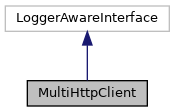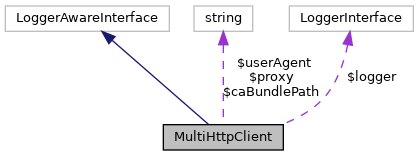Class to handle concurrent HTTP requests. More...


Public Member Functions | |
| __construct (array $options) | |
| __destruct () | |
| run (array $req, array $opts=[]) | |
| Execute an HTTP(S) request. More... | |
| runMulti (array $reqs, array $opts=[]) | |
| Execute a set of HTTP(S) requests concurrently. More... | |
| setLogger (LoggerInterface $logger) | |
| Register a logger. More... | |
Protected Member Functions | |
| getCurlHandle (array &$req, array $opts=[]) | |
| getCurlMulti () | |
Protected Attributes | |
| string null | $caBundlePath |
| SSL certificates path More... | |
| int | $connTimeout = 10 |
| LoggerInterface | $logger |
| int | $maxConnsPerHost = 50 |
| resource | $multiHandle = null |
| string null | $proxy |
| proxy More... | |
| int | $reqTimeout = 300 |
| bool | $usePipelining = false |
| string | $userAgent = 'wikimedia/multi-http-client v1.0' |
Detailed Description
Class to handle concurrent HTTP requests.
HTTP request maps are arrays that use the following format:
- method : GET/HEAD/PUT/POST/DELETE
- url : HTTP/HTTPS URL
- query : <query parameter field/value associative array> (uses RFC 3986)
- headers : <header name/value associative array>
- body : source to get the HTTP request body from; this can simply be a string (always), a resource for PUT requests, and a field/value array for POST request; array bodies are encoded as multipart/form-data and strings use application/x-www-form-urlencoded (headers sent automatically)
- stream : resource to stream the HTTP response body to
- proxy : HTTP proxy to use
- flags : map of boolean flags which supports:
- relayResponseHeaders : write out header via header() Request maps can use integer index 0 instead of 'method' and 1 instead of 'url'.
- Since
- 1.23
Definition at line 48 of file MultiHttpClient.php.
Constructor & Destructor Documentation
◆ __construct()
| MultiHttpClient::__construct | ( | array | $options | ) |
- Parameters
-
array $options - connTimeout : default connection timeout (seconds)
- reqTimeout : default request timeout (seconds)
- proxy : HTTP proxy to use
- usePipelining : whether to use HTTP pipelining if possible (for all hosts)
- maxConnsPerHost : maximum number of concurrent connections (per host)
- userAgent : The User-Agent header value to send
- Exceptions
-
Exception
Definition at line 78 of file MultiHttpClient.php.
◆ __destruct()
| MultiHttpClient::__destruct | ( | ) |
Definition at line 444 of file MultiHttpClient.php.
Member Function Documentation
◆ getCurlHandle()
- Parameters
-
array &$req HTTP request map array $opts - connTimeout : default connection timeout
- reqTimeout : default request timeout
- Returns
- resource
- Exceptions
-
Exception
Definition at line 285 of file MultiHttpClient.php.
References $header, $matches, $name, $query, $req, $userAgent, $value, as, list, and use.
Referenced by runMulti().
◆ getCurlMulti()
|
protected |
- Returns
- resource
Definition at line 425 of file MultiHttpClient.php.
References $multiHandle.
Referenced by runMulti().
◆ run()
Execute an HTTP(S) request.
This method returns a response map of:
- code : HTTP response code or 0 if there was a serious cURL error
- reason : HTTP response reason (empty if there was a serious cURL error)
- headers : <header name/value associative array>
- body : HTTP response body or resource (if "stream" was set)
- error : Any cURL error string The map also stores integer-indexed copies of these values. This lets callers do:
- Parameters
-
array $req HTTP request array array $opts
- connTimeout : connection timeout per request (seconds)
- reqTimeout : post-connection timeout per request (seconds)
- Returns
- array Response array for request
Definition at line 118 of file MultiHttpClient.php.
References runMulti().
◆ runMulti()
Execute a set of HTTP(S) requests concurrently.
The maps are returned by this method with the 'response' field set to a map of:
- code : HTTP response code or 0 if there was a serious cURL error
- reason : HTTP response reason (empty if there was a serious cURL error)
- headers : <header name/value associative array>
- body : HTTP response body or resource (if "stream" was set)
- error : Any cURL error string The map also stores integer-indexed copies of these values. This lets callers do: All headers in the 'headers' field are normalized to use lower case names. This is true for the request headers and the response headers. Integer-indexed method/URL entries will also be changed to use the corresponding string keys.
- Parameters
-
array $reqs Map of HTTP request arrays array $opts - connTimeout : connection timeout per request (seconds)
- reqTimeout : post-connection timeout per request (seconds)
- usePipelining : whether to use HTTP pipelining if possible
- maxConnsPerHost : maximum number of concurrent connections (per host)
- Returns
- array $reqs With response array populated for each
- Exceptions
-
Exception
Definition at line 148 of file MultiHttpClient.php.
References $batch, $name, $req, $value, as, captcha-old\count, getCurlHandle(), and getCurlMulti().
Referenced by run().
◆ setLogger()
| MultiHttpClient::setLogger | ( | LoggerInterface | $logger | ) |
Register a logger.
- Parameters
-
LoggerInterface $logger
Definition at line 440 of file MultiHttpClient.php.
References $logger.
Member Data Documentation
◆ $caBundlePath
|
protected |
SSL certificates path
Definition at line 52 of file MultiHttpClient.php.
◆ $connTimeout
|
protected |
Definition at line 54 of file MultiHttpClient.php.
◆ $logger
|
protected |
Definition at line 66 of file MultiHttpClient.php.
Referenced by setLogger().
◆ $maxConnsPerHost
|
protected |
Definition at line 60 of file MultiHttpClient.php.
◆ $multiHandle
|
protected |
Definition at line 50 of file MultiHttpClient.php.
Referenced by getCurlMulti().
◆ $proxy
|
protected |
proxy
Definition at line 62 of file MultiHttpClient.php.
◆ $reqTimeout
|
protected |
Definition at line 56 of file MultiHttpClient.php.
◆ $usePipelining
|
protected |
Definition at line 58 of file MultiHttpClient.php.
◆ $userAgent
Definition at line 64 of file MultiHttpClient.php.
Referenced by getCurlHandle().
The documentation for this class was generated from the following file:
- includes/libs/MultiHttpClient.php
